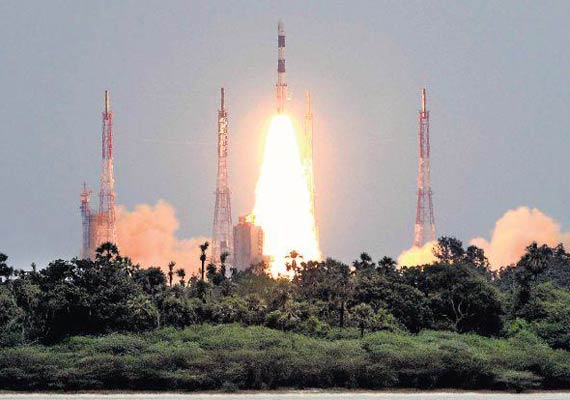Sriharikota, Oct 12: An Indo-French satellite Megha-Tropiques was today successfully placed in orbit by PSLV-C18 rocket in a perfect launch from Satish Dhawan Space Centre as part of a key mission that will help understand global tropical weather.
Along with Megha-Tropiques, Indian Space Research Organisation's workhorse Polar Satellite Launch vehicle (PSLV) also shot into space three nano satellites—VesselSat - 1 from Luxembourg, SRMSat from SRM University, Chennai, and Jugnu from IIT, Kanpur.
The four satellites were injected into orbit one after another in clockwork precision about 26 minutes after PSLV lifted off in a plume of smoke at 11 AM, in a mission described as a “grand success” by ISRO Chairman K Radhakrishnan.
“PSLV-C18 has been a grand success. Very precisely, four satellites were injected in space orbit and the difference between what we planned and what we achieved is just two km over an altitude of 867 km,” he told scientists after the launch.
The rocket first injected the 1000-kg Megha-Tropiques satellite into an orbit of 867 km altitude at an inclination of 20 degrees with respect to the equator.
Megha-Tropiques carries three payloads - two by French space agency CNES (Centre National d'Etudes Spatiales) and one jointly by ISRO and CNES - and a complementary scientific instrument.
ISRO has built the satellite at a cost of Rs 80 crore with “equal contribution” from CNES.
Megha-Tropiques (Megha meaning cloud in Sanskrit and Tropiques denoting tropics in French) will investigate the contribution of water cycle in the tropical atmosphere to climate dynamics.
Information beamed by Megha-Tropiques is expected to benefit not only India, but also all countries in the Indian Ocean region and other parts of the world.
Jugnu, a three-kg satellite, has a camera system to take pictures of the Earth to monitor vegetation, reservoirs, lakes and ponds. Data received from it will be studied with a tracking system installed at IIT-Kanpur, and pictures and information received will be used for research.
‘Jugnu' will also help gather information on floods, drought and disaster management.
SRMSat, developed by SRM University and ISRO, weighs 10.9 kg and aims to monitor carbon dioxide and water vapour using a grating spectrometer.
Luxembourg's Luxspace developed and built VesselSat-1 weighs 28.7 kg and carries receivers to detect signals automatically transmitted by vessels at sea in the region covered by the satellite footprint.
Today's mission is ISRO's third successful one this year from India, besides another from French Guyana. This is the Indian space agency's 20th successful venture using PSLV.
The simultaneous 50-hour countdown commenced On October 10, with the Launch Authorisation Board clearing the launch.
Speaking on the occasion, former ISRO Chairman and noted scientist Dr Kasturi Rangan said”I don't have to say much about PSLV. It has become synonymous with perfection in launch and space transportation (for ISRO)”.
Congratulating scientists involved in the task,he said Megha Trpiques opens up a new ear of atmospheric research, especially in the tropical weather system.
ISRO Mission Director Kunhi Krishnan said the successful launch of PSLV-C18 “is yet another glorious chapter (in ISRO)”.
“The PSLV has many unique features. It was a spectacular launch.. We are ready for the next launch also,” he said.
ISRO Project Director (Megha Tropiques) Raju said the whole scientific world was looking to launch of Megha Tropiques.
“It will be five years in orbit and the data is expected to come in two to three weeks (from now)”, he said. PTI

